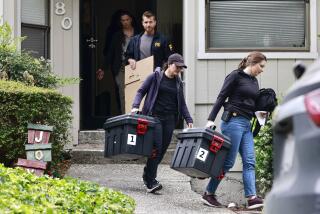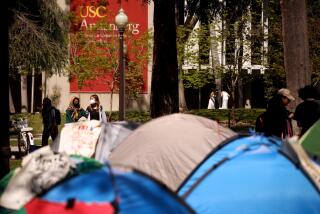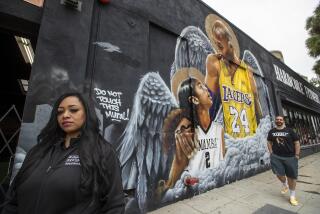Burbank middle school removes mural of Nobel Peace Prize winner Aung San Suu Kyi
Burbank Unified school officials have removed a mural of Myanmar leader Aung San Suu Kyi from a local campus, the action coming the same week that the Nobel Peace Prize laureate appeared at the International Court of Justice to denounce genocide charges levied against her country’s military.
Four years ago, Suu Kyi, whose official title is the state counselor of Myanmar, was one of 15 historical figures depicted in murals painted at Muir Middle School’s Hall of Heroes.
“The murals are supposed to serve as examples of what our students can aspire to,” Muir principal Greg Miller said earlier this week.
Local artist Randall Williams included Suu Kyi among icons such as suffragette Susan B. Anthony, civil rights giant the Rev. Martin Luther King Jr. and naturalist and author John Muir, the school’s namesake.
Since then, Muir Middle, a school that prides itself on artwork, has added five more murals, including baseball pioneer Jackie Robinson, scientist Albert Einstein and former First Lady Eleanor Roosevelt.
The Suu Kyi mural is the first to be taken down, and Miller said it was at no cost to the district.
When asked if anyone had complained about the mural, Miller said in an emailed statement, “Not one individual — and there have been hundreds of adults that have walked the hallway just to see the portraits — has ever said anything about her and this current situation.”
No official reason was given for the mural’s removal.
Burbank Unified Supt. Matt Hill did not respond to an inquiry.
Since the mural was painted, Suu Kyi has undergone a political transformation that has stunned many supporters.
An admirer of Gandhi, Suu Kyi was awarded the Nobel Peace Prize in 1991 “for her nonviolent struggle for democracy and human rights” against Myanmar’s military regime, according to the Nobel Peace Prize Committee.
For her efforts, she was placed under house arrest for 15 years and not fully freed until 2010.
Even imprisoned, she was a founder of the country’s National League for Democracy, a pro-democracy party, in 1988. She served as its general secretary and stayed in office until 2011.
The next year, Suu Kyi was elected to a parliamentary seat en route to eventually becoming the state leader in 2016.
“She had a moment in history where she rose to the occasion of really taking on forces for democracy against authoritarian oppression,” said Eric Schockman, professor of politics and international relations at Woodbury University.
Since 2017, Suu Kyi, the country’s civilian leader, has stood silently as the primarily Buddhist nation’s army has forced 671,000 Rohingya Muslims to flee the country’s Rakhine state, according to Human Rights Watch, “to escape the military’s large-scale ethnic cleansing.”
She made her final defense of the nation’s military action at the International Court of Justice on Wednesday, admitting some excessive force and violence, but not genocide.
Charges have not been filed against Suu Kyi individually.
“The great leaders of Burbank see her as someone to be stripped of past honors, and I think it’s a little premature,” Schockman said.
The action continues a discussion about the worthiness of heroes or icons within school facilities.
In April, Burbank Unified’s board voted, 5 to 0, to change the name of David Starr Jordan Middle School.
Jordan was a famed fish scientist and the first chancellor of Stanford University, along with being a proponent of eugenics, a system of controlled breeding that aimed to create better genetic characteristics. The ideology was later adopted by the Nazis.
Those who defended Jordan in public forums often feared opening “a can of worms” that could affect schools named after Founding Fathers Thomas Jefferson and George Washington, who were both slave owners.
“Case by case would be my response,” Schockman said of name changes. “Who is without foibles? I just don’t think you can blanket everyone through some sort of political correctness, and sometimes people’s reputations shouldn’t be tied to a one-off.”
Campa writes for Times Community News.
More to Read
Sign up for Essential California
The most important California stories and recommendations in your inbox every morning.
You may occasionally receive promotional content from the Los Angeles Times.










